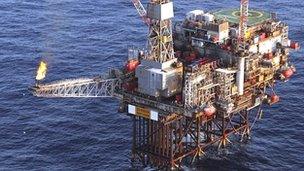OBR lowers forecast for oil and gas tax revenues
- Published

The OBR has continued to project a decline in oil and gas production at a rate of 5% per year
The body that provides independent economic forecasts ahead of UK budgets has lowered its estimate of revenue from offshore oil and gas.
The Office for Budget Responsibility (OBR) said the total amount the UK could expect from taxation between 2018 and 2041 was £56bn, down from £67bn.
That represents a fall from 0.7% of gross domestic product in 2011/12 to 0.4% for financial year 2012/13.
Its forecast is a continuing decline to 0.2% of GDP by 2017/18.
The OBR says long-term projection shows revenues falling to 0.03% of GDP over the subsequent two decades.
Two years ago, it said that share would be more than three times higher, at 0.1%, cutting it in half to 0.05% last year, before this year's further cut.
The importance and level of oil revenues has traditionally been a bone of contention between the UK and Scottish governments. It is featuring prominently in the independence referendum campaign.
The OBR has not calculated the implications for an independent Scotland, or the likely share of its economy that oil and gas revenue might represent.
Oil prices
Its figures have changed due to a lower estimate of where oil prices will be by 2040/41. Its assumption is that they will go down from the $173 per barrel it calculated last year to $150.
The calculations have also changed because the Treasury has agreed with the industry on a regime of tax breaks for decommissioning of ageing offshore equipment. Last year, it set aside £20bn for decommissioning.
It has continued to project a decline in production at a rate of 5% per year, which would be slower than the 7.8% a year on average since 1999.
In response to the forecasts, the Scottish government said Scotland's oil and gas sector was "going from strength to strength", with investment in the North Sea projected to reach a record £13bn in 2013 while planned total investment by companies was worth about £100bn.
Forecast 'cautious'
A spokeswoman said: "There are estimated to be up to 24 billion barrels of oil remaining with a potential wholesale value of £1.5 trillion remaining in the North Sea which means, by value, more than half of North Sea oil and gas resources have still be to be extracted.
"The OBR's central forecast is cautious and relies on both production and price forecasts below the levels assumed by industry and other independent bodies.
"The report shows that adopting the latest industry production forecasts could boost future tax revenues by £17.4bn above the OBR's central forecast, whilst assuming prices follow a path similar to that assumed by the International Energy Agency would boost future receipts by £25.9bn."
Reacting to the OBR report, Chief Secretary to the Treasury Danny Alexander said: "Scotland has a thriving oil industry that plays a key role in the UK economy.
"But independent forecasts like the OBR's today consistently show that oil revenues are set to decline in the long term, a fact confirmed by John Swinney's secret internal analysis.
"This would leave a massive gap in an independent Scotland's finances.
He added: "Scotland is better off dealing with a volatile resource like oil in the UK, where together we can provide the long-term certainty on decommissioning relief that is helping to bring forward investment right now, while managing both the fluctuations and the projected decline in revenues."
The Scottish Conservatives described the revised forecast as "a huge blow to the SNP, whose main economic argument for breaking away from the UK is based on increasing oil and gas revenues".
- Published18 April 2013
- Published20 March 2013
- Published25 February 2013